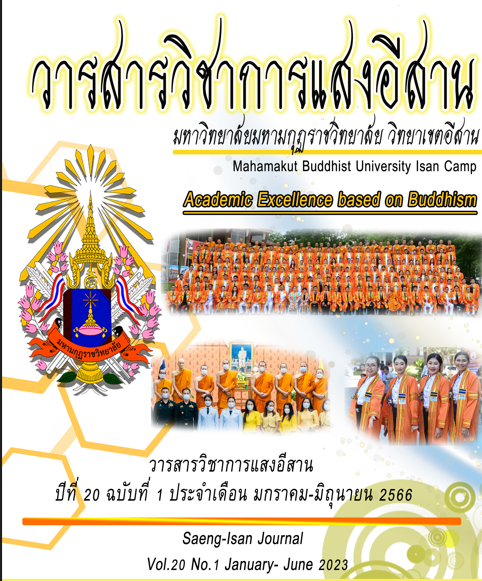การยกระดับองค์กรภาครัฐสู่ความเป็นรัฐบาลดิจิทัล
องค์กร; ภาครัฐ; รัฐบาลดิจิทัล
คำสำคัญ:
Upgrading, government organizations, dingital government.บทคัดย่อ
The purpose of this article is to present an organizational transformation towards Digital government is a form of digital technology, be used as a tool for government administration and public service by improving the management and integration of government information and working to be consistent and linked together in a secured and good governance. To increase efficiency and facilitate public service disclose government information to the public and create participation of all sectors. Transforming the public sector into digital government is one of the government's key strategies to increase the country's economic competitiveness.
Due to public administration, which is an important engine to raise the level of national administration and providing public services with digital technology to make the operation transparent efficient and effective which will make the Thai government progress to catch up with the world and can compete in the modern world making communication between the people and the people and the public and the government possible more quickly.
It also increases the opportunity for the public to participate in defining and reflecting the demand for government services, including monitoring the work of the government to ensure transparency, so that the government's manpower is aware of the urgent need to change the context. Forms and methods of working in the public sector to be ready on both sides "Mindset" (Mindset) and "Skill" (Skill). Transforming to Digital Government reduce redundancy and increase the efficiency of sharing digital technology resources and services. It is upgrading government organizations to become digital governments.
เอกสารอ้างอิง
กลุ่มยุทธศาสตร์และแผนการประชาสัมพันธ์ สำนักโฆษก. (2559). นายกรัฐมนตรีเป็นประธานการประชุมคณะกรรมการเตรียมการด้านดิจิทัลเพื่อเศรษฐกิจดิจิทัลและสังคม ครั้งที่ 1/2559. สืบค้นจาก http://www.thaigov.go.th/index.php/governmentth1/item/99971-id99971, สืบค้นเมื่อ 22 พฤศจิกายน 2565
ราชกิจจานุเบกษา. (2562). พระราชบัญญัติการบริหารงานและการให้บริการภาครัฐผ่านระบบดิจิทัล
พ.ศ. 2562.สืบค้นจาก:https://www.dga.or.th/wp-content/uploads/2021/02/5.pdf,
สืบค้นเมื่อ 20 พฤศจิกายน 2565.
ศูนย์เทคโนโลยีสารสนเทศและการสื่อสาร. (2561). เอกสารโครงการสำนักงานปลัด สำนักนายกรัฐมนตรียุคดิจิทัล (Digital OPM). กรุงเทพมหานคร : สำนักงานปลัดสำนักนายกรัฐมนตรี.
สำนักงานคณะกรรมการดิจิทัลเพื่อเศรษฐกิจและสังคมแห่งชาติ. (2560). แผนพัฒนารัฐบาลดิจิทัลของ ประเทศไทย พ.ศ. 2560-2564. (2560). กรุงเทพฯ: ส่วนนโยบายรัฐบาลอิเล็กทรอนิกส์ ฝ่าย นโยบายและยุทธศาสตร์สำนักงานรัฐบาลอิเล็กทรอนิกส์ (องค์การมหาชน).
สำนักงานคณะกรรมการข้าราชการพลเรือน. (2565) สาระสำคัญของแนวทางการพัฒนาบุคลากรภาครัฐ พ.ศ. 2563 – 2565. สืบค้นจาก https://www.ocsc.go.th/civilservice, สืบค้นเมื่อ 22 พฤศจิกายน 2565.
สำนักงานคณะกรรมการกฤษฎีกา. (2561). รัฐบาลดิจิทัล. สืบค้นจากhttps://www.krisdika.go.th/web/psdgksdk/governmentdigital, สืบค้นเมื่อ 24 พฤศจิกายน 2565.
Bedi, K., Singh, P. J., & Srivastava, S. (2001). Government @ net: new
governance opportunities for India. New Delhi: Sage Publications.
European Commission (E.C.). (2017). The Digital Economy & Society Index (DESI).
Retrieved from https://ec.europa.eu/digital-single-market/en/news/digital-economy-and-societyindex-desi-2017, Accessed on 22nd November 2022
Gartner, 2016, Mark Williams, Clementine Valayer, Digital Government
Benchmark, Study on Digital Government Transformation, Final Report, ISA2 action 2016.10: ELISE, European Location Interoperability Solutions for e-Government,European Commission
Marcus, B. (2015). Digital literacy and e-skills: participation in the digital economy.
Melbourne: Innovation & Business Skills Australia.
United Nations Public Administration Network. (2022). Electronic and mobile
government. Retrieved from https://publicadministration.
un.org/ publications/content/unpan.html, Accessed on 22nd November 2022
ดาวน์โหลด
เผยแพร่แล้ว
ฉบับ
ประเภทบทความ
สัญญาอนุญาต
ลิขสิทธิ์ (c) 2023 วารสารวิชาการแสงอีสาน

อนุญาตภายใต้เงื่อนไข Creative Commons Attribution-NonCommercial-NoDerivatives 4.0 International License.
เนื้อหาและข้อมูลในบทความที่ตีพิมพ์ในวารสาร ถือเป็นข้อคิดเห็นและความรับผิดชอบของผู้เชียนบทความโดยตรง ซึ่งวารสารไม่มีส่วนเกี่ยวข้อง นอกจากนั้น ผู้เขียนทุกท่านต้องยืนยันว่าบทความต้นฉบับที่ส่งมาตีพิมพ์เผยแพร่นั้น จะต้องไม่เป็นบทความที่กำลังอยู่ในการพิจารณาเพื่อตีพิมพ์ในวารสารอื่นหรือเคยตีพิมพ์เผยแพร่มาแล้ว หากมีการใช้ภาพ ข้อความหรือตารางของผู้เขียนหรือผู้นิพนธ์ท่านอื่น ผู้เขียนจะต้องอ้างแหล่งที่มาหรือเจ้าของลิขสิทธ์
Publication Ethic:
The detail published in Saeng Isan Journal is opinion and responsibility of the authors, and it is not relevant with the jouranl. Besides, the authors must certify that the original manuscript is not in the process to publish in other journals or used to publish in other journals. If the authors use paragraphs, pictures or tables from others, the athours must refer to the original sources.
Article Consideration:
Each article will be published by a panel three journalists with expertise in relevant fields, and get the editorial approval before publishing. The review is in the form of The article's double blind.
To comply with copyright law. The author must sign the copy of the article submission form to the journal. In addition, the author must confirm that the original article submitted to the journal is only one publication in Saeng Isan Journal. If the images or tables of other authors appearing in other publications are used, the author must ask permission of the copyright owner before publishing.


